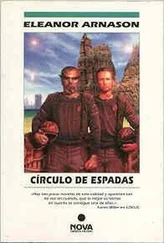She worked and thought. After a while she got an idea. It seemed crazy to her. There was only one thing to do with a crazy idea. Tell it. Only men kept quiet when something was bothering them. Or women who were doing or thinking something that was shameful.
Nia spoke to Tanajin.
“The clouds are in the south, where the hairless people are. They are new, and the clouds are new. Therefore they are responsible.”
“Maybe.”
“I told you about their boats. The boats leave a trail in the water. The trail is white. It forms rapidly and then vanishes. Maybe the clouds are trails as well.”
“In the sky?” said Tanajin. “Don’t be ridiculous. First you said these people are able to fling stones around like demons. Now you say they can float in the sky like spirits. How likely is any of this?”
Nia made the gesture of concession. “Not very.”
“You have spent too much time alone, Nia. You are getting crazy ideas.”
Nia made the gesture that meant “yes.”
Travelers came from the west and built a signal fire. Tanajin went to get them: five large morose women. Their tunics had brightly colored vertical stripes. Their saddlebags were different from anything Nia had ever seen before: large baskets made of some kind of plant fiber and striped horizontally.
The women spoke with thick accents. They belonged to the Finely Woven Basket People, they said. A boat had come to their village out of the sky.
“Huh!” said Tanajin.
“I say it was a boat because it carried people.” The travel leader spoke. She was the largest of the women with a belly that made her look pregnant. But pregnant women did not usually travel. Maybe she was fat. Nia didn’t know a polite way to ask.
“It didn’t look like any boat I have seen. It looked like the birds that our neighbors make to hang on standards. The birds are gold. Their bodies are fat. Their wings are long and narrow. They have eyes made of various kinds of crystal.”
Another woman said, “This thing—this boat—had two large eyes in front that shone like crystal. There were other eyes—little ones—that went along the sides. Hu! It was peculiar.”
The travel leader frowned.
The other woman made the gesture that was an apology for interrupting.
The travel leader said, “The people in the boat had almost no fur. One of them spoke the language of gifts, though very badly. This person said they wanted to come and visit and exchange stories.”
Tanajin looked at Nia. “You weren’t crazy.”
“What does that mean?” asked the travel leader.
“There have been clouds in the sky. This woman said they were caused by boats that belonged to the hairless people.”
“How did you know?” asked a woman.
Nia said, “Finish your story. I will tell you later.”
“We didn’t know what to do,” said the travel leader. “Our shamaness decided to ask for advice. She sent us to the Amber People to ask for their opinion. Another group has gone to the Iron People and another to the People of Fur and Tin.
“We have a quarrel going with the Gold People. They’re our closest neighbors. They have tongues like knives and they like to make up satiric poetry. We aren’t going to ask them for anything.”
“Also,” said another woman, “they live in the high mountains. We don’t like going there. Hu! It is dark! The trail goes up and down!”
“We are people of the plain,” said the leader. “We like to be able to see all the way to the horizon.”
Nia made the gesture of agreement. “The Iron People have agreed to let the hairless people visit. I don’t know what the Amber People have decided.”
“That is how you know,” said the travel leader. “You have seen these people.”
“Yes,” said Nia. “But I had not seen the kind of boat you describe.”
The women asked questions. Nia said as little as possible. She didn’t want to describe the long journey from the east. She didn’t want to explain why she hadn’t been living with her own people.
“It’s obvious that you know more than you are telling,” the travel leader said finally. “That’s your decision and not our problem. We have been sent to the Amber People.”
The next day the women continued on their journey. Nia finished working at the forge.
“I’ve been waiting for this,” said Tanajin.
Nia made the gesture of inquiry.
“Ulzai keeps appearing in my dreams. He speaks urgently. I don’t understand him. Usually he is wet. That ought to mean he has drowned, but I don’t know for certain. What does he want? Why is he bothering me?”
Nia made the gesture of ignorance.
“I am going to make a new raft and float downriver. I’ll ask about him in the village of the hairless people. Maybe they have found his body.
“After that I’ll keep going. There is a village on the river below the lake. The people there never move. Their houses are wood. They are always in them.” Tanajin paused.
“Their gift is a certain kind of very large fish. They smoke it and pickle it. They also preserve the eggs of the fish and the stuff that the male fish produce. Their shamaness is famous for her wisdom. I’m going to ask her to explain my dreams. Maybe I need a ceremony of propitiation.”
“That could be,” said Nia. “What about the crossing?”
“People can do what they used to do before I came.”
“The crossing has been your gift.”
“You will continue traveling. That’s the kind of person you are. If I stay here alone, I’ll go crazy. I’ll find a new gift—maybe among the Fish Egg People, maybe farther south.”
Nia helped Tanajin build the raft. It took five days. When they were finished she said, “Teach me how to paddle.”
“Why?” asked Tanajin.
“I think I’ll stay here for a while. When people come, I’ll take them across. I’ll explain that you have gone, and that I will be leaving soon. The news will get around. People will know to bring axes with them.”
Tanajin made the gesture of agreement.
She stayed another fifteen days. They spent most of their waking time on the water. Nia learned how to swing the big heavy paddle and what lay under the surface of the river. There were islands that only appeared in the very worst dry years, but they were always there and the raft might get caught on one. There were logs—more than any person could count. Some floated on top of the water. Others floated underneath. Some had gotten caught in the mud of the river bottom and stood upright like living trees, their branches reaching toward the surface. Others were held less tightly by the mud and swung back and forth in the water.
“Like reeds in the wind,” said Tanajin. “Or a tree that is starting to break.”
“Aiya!” said Nia.
“Every kind of log is dangerous. If the raft gets caught, you may not be able to get free. Never let a rope trail. Always carry a knife. Always keep an eye on the surface. If there are swirls and eddies—avoid that place!”
“There is more to this than I realized,” said Nia.
Tanajin barked. “You people in the north are so ignorant! You think the river is like the plain. You think that everything that matters is on the surface, where any fool can see it.”
Nia kept her teeth clenched together. A teacher always had the right to at least a few insults. Everyone knew that. It was true among all peoples.
Finally Tanajin said, “You aren’t skillful yet, and you don’t know enough about the river, but I think you’ll be able to manage. I’ll leave you now.”
Nia made the gesture of acknowledgment.
The next morning Tanajin piled her belongings on the new raft. Nia helped push the raft out into the river. Tanajin climbed on and made the gesture of farewell.
Читать дальше












